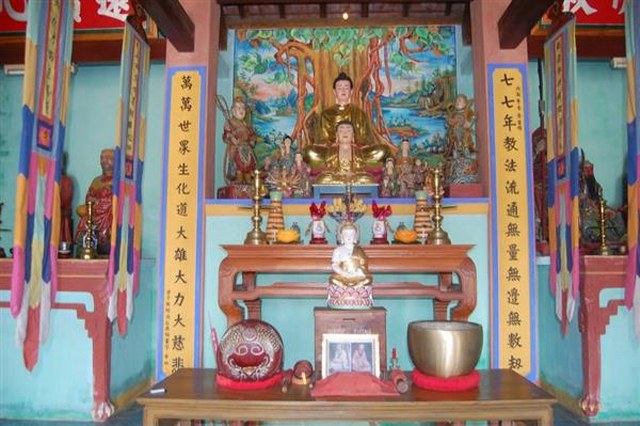Description
* Monumental features
According to the book Khanh Hoa, cultural appearance of a land (volume 3), Phuoc Hue pagoda dates back to the end of the 18th century during the Nguyen Anh and Tay Son wars.
Phuoc Hue Pagoda is located on a large area of 3,152m2, surrounded by rice fields. From the outside looking in, there are the following work items: Tam Quan, temple yard, Buddha hall, east house, west house, Am Soul Temple.
Phuoc Hue Pagoda worships Shakyamuni, Guan Yin Bodhisattva, Bodhidharma, Maitreya, the ancestors of the temple...

Decorate the altar inside the Buddha hall
Over time along with the harsh climate and war, Phuoc Hue pagoda has undergone many renovations in the years: 1946, 1996, 1998, 1999, 2005, 2012.
Every year, Phuoc Hue Pagoda organizes Buddhist festivals, with two major festivals being Buddha's Birthday (April 15 of the lunar calendar) and Vu Lan festival (July 15 of the lunar calendar).
* Historical events taking place at the monument
During the resistance war against the French colonialists and the American imperialists, Phuoc Hue pagoda was the base for communication, concealment, nurturing revolutionary cadres, printing leaflets and documents, hiding weapons... of the army. and the people of Ninh Hoa district in particular and Khanh Hoa province in general, contributing to the overall victory of the country. Specific events are as follows:
- In 1946, in harmony with the boiling atmosphere with the whole country against the French colonialists, teachers and students of Phuoc Hue pagoda were enlightened with revolutionary ideals, quietly operated, and contacted the Viet Minh in the Nam Ninh Hoa region. In order to erase the important place of the revolution, the French colonialists and their minions burned the temple. The monks of Phuoc Hue pagoda have mobilized Buddhists from far and near to contribute money and efforts to temporarily rebuild the temple to serve as a place for religious activities, and at the same time rebuild our revolutionary base.
- On May 12, 1946, the 1st Regiment of the Southern Army advancing the National Guard (under the Vo Quoc Thu unit), chose Phuoc Hue pagoda as the starting point to fight the French at the Battle of Cau Ca (Thanh My). In that battle, I annihilated hundreds of enemies, causing confusion and reducing the enemy's combat power for many months.
- Phuoc Hue Pagoda is also considered a training ground for many soldiers and cadres in the region, many local young people have been trained in the Party's revolutionary ideology, many cadres and soldiers have grown up since then. this revolutionary.
- In March 1948, Comrade Sang (surname unknown) resided in Hoa Thuan village (Ninh Binh commune) and comrade Nguyen Buu (self-named Phuc) resided in Thanh My village (Ninh Quang commune) operating in the base area. Da Ban revolutionary site and Nam Ninh Hoa region returned to Phuoc Hue pagoda to receive food supplies. After receiving food and returning to the base, he was ambushed by the French, Comrade Sang sacrificed himself, Comrade Buu, because he knew the neighborhood, escaped the enemy's encirclement. The teachers and students of Phuoc Hue pagoda mobilized people in the village to use cloth rulers and mats to bury the body of a revolutionary soldier who had just died and to set up an altar to worship with previous martyrs.
- Since 1954, teachers and students of Phuoc Hue pagoda have continued to participate in revolutionary activities, quietly connecting communication lines in the region. During this time, Phuoc Hue pagoda continued to be a place to hide and provide food for officials, and also a place to mobilize many classes of young people to participate in the revolution.
With a heart of patriotism, love for the people and early revolutionary enlightenment, the abbot of Phuoc Hue pagoda Thich Bao Hien lived a "good life and a good religion". He was called by the villagers by his simple and sincere name Black Chua Master. After his death, he was buried at the temple by the villagers, at the same time, he set up a tablet and dedicated a separate place to worship him.
In recognition of the contributions to religion, to life and to the revolution of Master Thich Bao Hien, the State awarded him the Second-class Order of the Resistance against the French and the Americans; family with meritorious services to the revolution, Medal for the cause of great national unity. With the Vietnam Buddhist Sangha, he is a monk who has made many contributions to the cause of local Buddhist revival. In 1992, he was ordained a monk by the Central Church.
On October 10, 2008, Khanh Hoa Provincial People's Committee issued Decision No. 2502/QD-UBND ranking Phuoc Hue Pagoda as a provincial historical - cultural relic.
